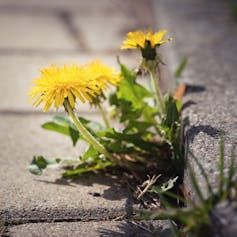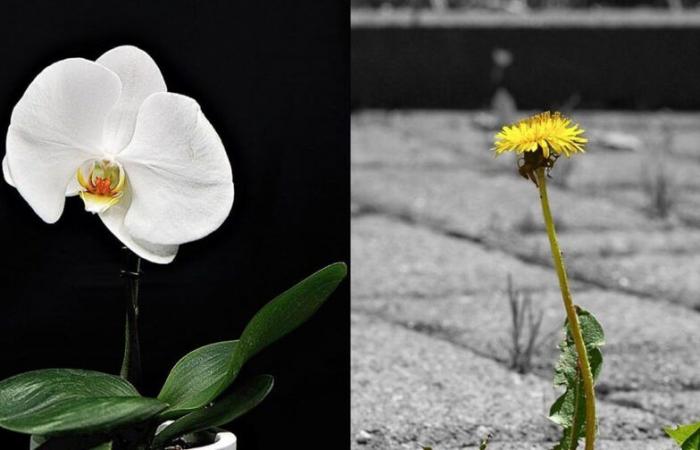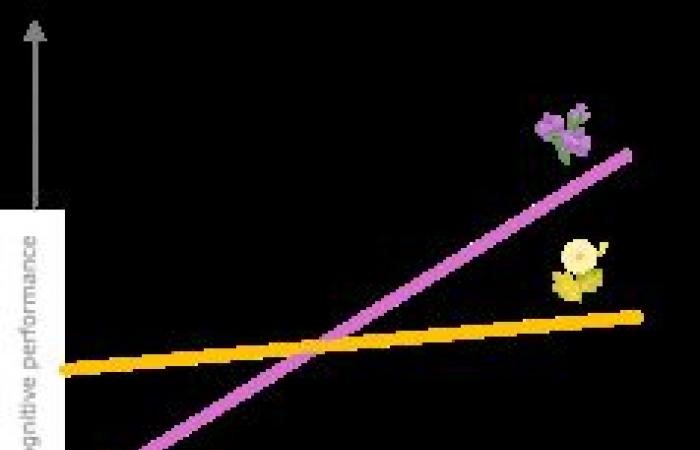As the global population ages, it is important to understand variability in cognitive aging. Why do some people retain their cognitive abilities while others experience substantial decline?
This question is at the heart of my doctoral research. Recent studies have highlighted the “orchid and dandelion” phenomenon in cognitive aging. It shows that certain people are, like orchids, very sensitive to their environment, and flourish or deteriorate depending on external conditions. Others, like dandelions, demonstrate resilience and maintain their cognitive performance regardless of their environment.
This approach can help us rethink our cognitive health interventions in older adults and generate more effective personalized strategies to curb cognitive decline.
The orchid and dandelion model
(Gerd Altman/Pixabay)
The orchid and dandelion metaphor emerged in the field of developmental psychology to describe individual differences in sensitivity to environmental conditions.
“Orchids” symbolize individuals strongly influenced by their environment, who thrive in optimal environments, but struggle with difficulty in less favorable environments. Conversely, “dandelions” represent resilient people, capable of remaining healthy regardless of external conditions.
As part of our research, we studied the impact of environmental factors on the cognitive performance of older people. The results indicate that the cognitive health of certain individuals—the “orchids”—is more vulnerable to environmental influences. We can also observe that “dandelions”, although they are more resistant to the harmful effects of the environment, benefit less from a favorable environment.
Impact of lifestyle choices on health
(Figure created by E. Rodrigues, adapted from Boyce (2019)), Author provided (no reuse)
The orchid and dandelion model helps to understand why lifestyle choices are not always predictive of health outcomes.
Take the example of people who adopt behaviors harmful to health, such as smoking, sedentary lifestyle, social isolation or other unfavorable conditions. Surprisingly, some of them live long lives and have relatively good cognitive health, which could be linked to their “dandelion” resilience.
On the other hand, other people who have healthy habits – regular exercise, good diet, no harmful substances – can still show cognitive decline, which reflects the vulnerability of “orchids”.
Thus, an “orchid” may experience a significant decline after a stressful event, but can, in a favorable and rich environment, outperform a “dandelion” which remains cognitively stable under most circumstances. These examples highlight the limitations of a one-size-fits-all approach to health and the need for individualized interventions.
Cognitive health interventions
Studies highlight the existence of a debate on the effectiveness of interventions in the field of cognitive health in older people. Studying the cognitive aging process from the perspective we propose could influence the design of interventions aimed at supporting the cognitive health of older people.
For “orchids”, targeted strategies such as promoting physical activity, cognitive training or social engagement could be beneficial. On the other hand, “dandelions” could benefit more from general health maintenance strategies.
By recognizing these individual differences, health care providers will be able to adopt personalized and more effective approaches to cognitive health, which could improve cognitive outcomes in older adults.
Repercussions on an aging society

(Petra/Pixabay)
With the world’s population aging, our research team’s findings are timely. Longer lifespans are expected to increase the prevalence of cognitive decline and dementia, posing a challenge for individuals, families and health care systems.
The current approach in the field of cognitive health, where we treat all individuals the same, may not be sufficient to address the complexities of cognitive aging. By better understanding how cognitive health varies between individuals, we will be able to develop interventions that are better suited to each person.
In the field of child development, it is estimated that 15 to 20% of children suffer from more than half of the cognitive diseases listed. These children are probably “orchids” who grow up in unfavorable environments.

(Sri Widosari/Unsplash)
Although it is currently unknown whether this proportion persists as we age and what the long-term implications may be, it is essential to recognize and respond to the specific needs of these people. By spotting the “dandelions,” which are more resistant to negative changes, and focusing early interventions, such as personalized social prescribing, on the “orchids,” we should be able to mitigate cognitive decline.
This approach can not only improve individual health outcomes, but also provide significant savings in health-related costs, making it an essential part of public health planning.
The orchid-dandelion model offers a new framework for understanding experiences related to cognitive aging. By recognizing individual environmental sensitivity, we can develop interventions to better support the cognitive health of older adults.
Further research is needed to better understand the implications of these findings, but a personalized approach may help more people maintain cognitive function and quality of life in old age.









